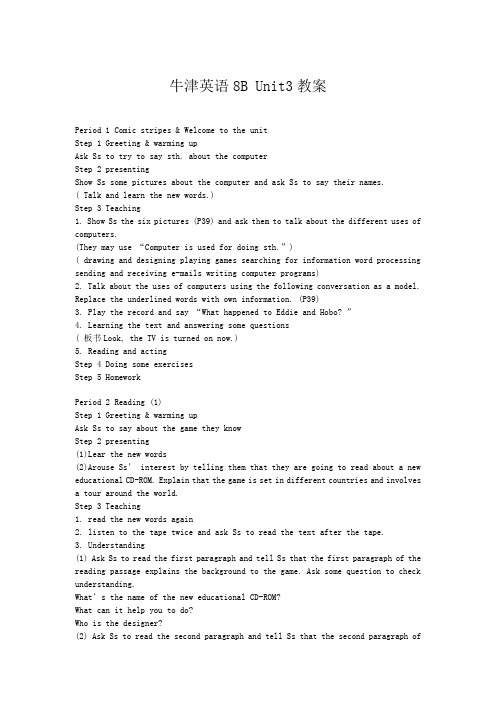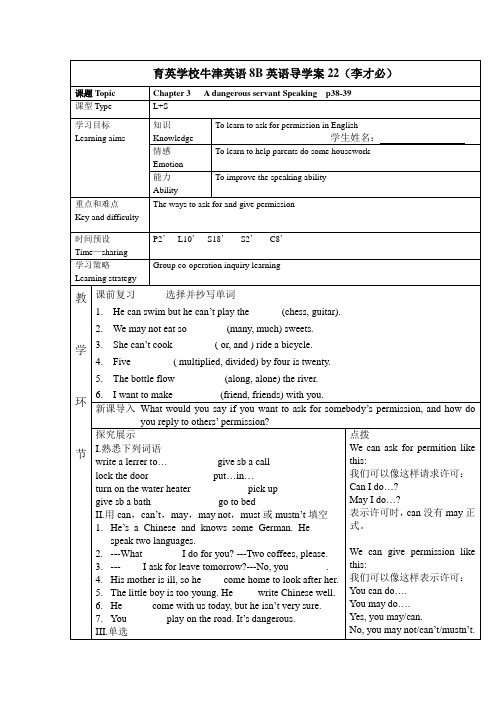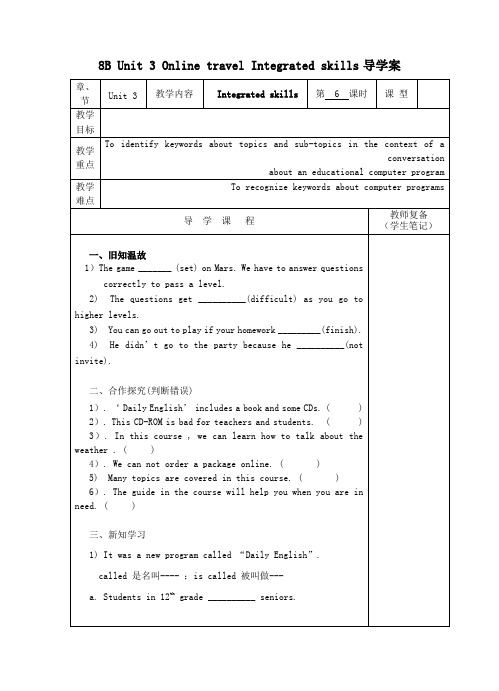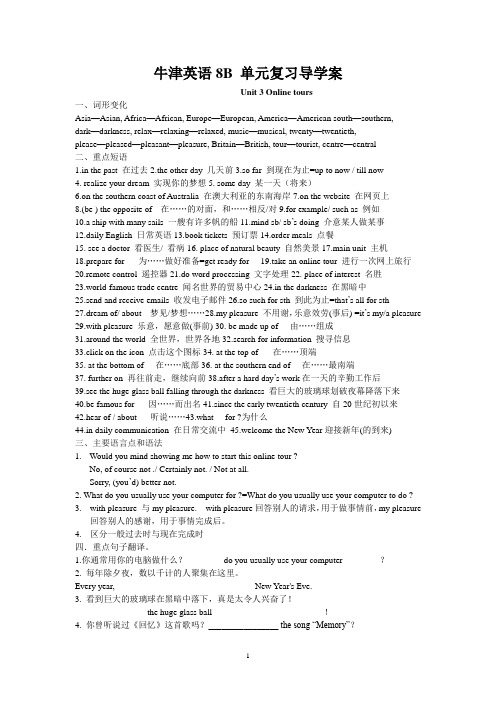沈阳版牛津英语8B英语导学案3
沈阳版牛津英语8B英语导学案21 (1) 2

Learning strategy
Group co-operation inquiry learning
教
学
环
节
教
学
环
节
课前复习熟悉下列单词
spell________ rise________ fiction________ non-fiction________ catalogue________ complete_______ comics________ properly________ toothache_________ silence________
2. may的用法
(1) may表示许可,比can正式,口语中常被can替代。(2) may表示可能性,常用于肯定句(语气比must弱)和否定句中(译作“可能不”,语气比can’t弱),指现在或将来的可能性。
在对由may引出的“请求许可”的问句做出肯定回答时,可以用过于严肃和正式的“Yes, you may.”,而更多用“Yes, please。(请便)”或“Of course/ Certainly(当然可以).”;否定回答时,常用“Please don't(请不要).”或“No, you mustn't(不行).”
I写出下列句中情态动词的汉语意思
1.The boy can speak English well.
2.Can I borrow this book?
3.I thought the story couldn’t be true.
4.You may go home now.
5.May I watch TV after supper?
A. May, can’t, may
B. Can, mustn’t, may
沈阳版牛津英语8B英语导学案20

育英学校牛津英语8B英语导学案19(李才必)课题Topic Chapter 3 A dangerous servant Reading(III) 课型Type L+S学习目标Learning aims 知识Knowledgewords and expressions学生姓名:情感EmotionTo know about electricity能力AbilityTo improve reading skills重点和难点Key and difficulty Words and expressions: Sentences: May I …?时间预设Time—sharingP2’L10’S18’S2’C8’学习策略Learning strategyGroup co-operation inquiry learning教学环节课前复习用所给动词的适当形式填空1. They _________ (be) friends since they were boys.2. Tom often _________ (go) to the school library to borrow books.3. By the end of last term, we _______ (learn) more than one thousand English words.4. Please _________ (not make) any noise. We are having a meeting.5. I am very sorry. I really _________ (not know) you were having a talk here.6. The boy is used to _________ (get) up early now.新课导入We have known something about France. Let’s know about it in detail now.探究展示翻译下列句子1.电是我们看不见的一种能量。
沈阳牛津英语B英语导学案

4. ---Excuse me. Where is Mr. Green’s office?--- It’s on_____ floor.
A. seven B. the seven C. the seventh D. seventh
9.construction建筑
10.scientist科学家
11.experiment实验
12.gravity重力
13.benaeth在下面
14.straight直
15.measurement测量
16.estimate估计/估量
17.collaspse坍塌
18.restrict限制,约束
反馈检测完型填空
2. The old couple _______ in an old hut.
A. used to living B. were used to live C. were use to living D. used to live
3. ---What shall we do this Sunday? ---Why ______ to the Science Museum?
1.A. a B. the C. more D. the most
2.A. only not B. not C. not only D. only
3.A. are going to B. is going to C. going to D. is going
4.A. In fact B. On fact C. In facts D. On facts
5.A. as B. during C. until D. while
沈阳版牛津英语8B英语导学案31

8 I don’t know when Jim ______ . I’ll meet him at the airport when he _______. returns, will return C will return, returns
2. How many family members does the poem mention?
A. Four B. Three C. Two D. One
3. The writer decides to_________.
A. stop eating turkey B. eat less next year
I find I’m lying on the floor,My pants are tighrer than before.
Thanksgiving is a time of cheer,Of thankfulness for friends so dear.
But please, God, if my prayer(祈祷) you hear, Remind me to eat less next year.
2 I need a dictionary . Who has got __________?
A one B it C that D this
3 Pinky isn’t feeling well because she has a pain _____ her back.
A in B on C to D under
2 Peter ________(咬) an apple and found the apple tasted good.
8B Unit 3 Online tours期末复习导学案含答案--牛津译林版英语八年级下册

初二期末考试复习教学案Unit 3单元词组归纳1.用遥控器换频道use the remote control to change the channel2.发现一个学英语的好网站find a good website for learning about English3.在网上搜索信息search for information on the Internet4.注意到在页面上方的旅行图标notice the “Tour” icon at the top of the page5.八小时环游世界around the World in Eight hours6.世界著名的贸易中心华尔街the world-famous trade centre Wall Street7.在曼哈顿岛的最南端at the southern end of Manhattan Island8.许多大公司和国际银行many big companies and international banks9.看大玻璃球在黑暗中落下see the huge glass ball falling through the darkness10.一天辛苦的工作后放松relax after a hard day’s work11.自20世纪早期以来以它的剧院而著名be famous for its theatres since the early twentieth century12.在页面底部的返回图标 a “Back” icon at the bottom of the page13.选择另一个城市然后开始你的网上旅行pick another city and then start your online tour14.买卖的活动the activity of buying and selling15.帮人们买去不同地方的票help people buy tickets to different places16.聚集在时代广场迎接新年gather in Times Square to welcome the new year17.梦想着不用护照环游世界dream of traveling around the world without a passport18.通过进行一个网上旅行实现你的梦想realize your dream by taking an online tour19.在澳大利亚的东北海岸on the north-east coast of Australia20.看起来像一条许多帆的船look like a ship with many sails21.在不同国家的相反季节the opposite seasons in different countries22.展示给我怎样开始这次网上旅行show me how to start this online tour23.用图表来组织我们的想法use charts to organize our ideas24.向你的同学介绍一个电脑课程introduce a computer course to your classmates25.预定票和旅馆book tickets and hotels26.在日常交流中用英语use English in daily communication27.在这个古老的欧洲国家的许多宫殿和城堡many palaces and castles in this old European country28.有许多自然美景have many places of natural beauty29.由……组成be made up of……30.在介绍中加入一些图片让它更有趣add some pictures to the introduction to make it more interesting31.在不同国家之间的不同点differences between the different countries32.发送和接收电子邮件send and receive emails33.来自著名的百老汇音乐剧《猫》come from the famous Broadway musical Cats34. 进行文字处理do word processing35. 一大片草坪 a large green lawn重点句子1.看,这个节目一个小时前就开始了。
沈阳版牛津英语8B英语导学案33

学习策略
Learning strategy
Group co-operation inquiry learning
教
学
环
节
教
学
环
节
课前复习写出下列动词的过去式和过去分词
defeat_______ _______beat_______ _______spread_______ _______ buy_______ ______
2. The water f__________ in winter and melts in spring.
3. You’re so tired and you should have a r___________.
4. The population inChinai___________ every year.
enable_______ _______lead_______ _______wet_______ _______ sell_______ ________
scratch_______ _______rise_______ _______bite_______ _______slam_______ _______
A.much informationB.many informations
C.much more informationD.many more information
课后作业选择并抄写单词
1.About two _________(three, third, thirds) of the earth is covered by water.
Expressions: more valuable than, the amount of, remain the same, be covered by
牛津英语8B Unit3教案

牛津英语8B Unit3教案Period 1 Comic stripes & Welcome to the unitStep 1 Greeting & warming upAsk Ss to try to say sth. about the computerStep 2 presentingShow Ss some pictures about the computer and ask Ss to say their names.( Talk and learn the new words.)Step 3 Teaching1. Show Ss the six pictures (P39) and ask them to talk about the different uses of computers.(They may use “Computer is used for doing sth.”)( drawing and designing playing games searching for information word processing sending and receiving e-mails writing computer programs)2. Talk about the uses of computers using the following conversation as a model. Replace the underlined words with own information. (P39)3. Play the record and say “What happened to Eddie and Hobo? ”4. Learning the text and answering some questions( 板书Look, the TV is turned on now.)5. Reading and actingStep 4 Doing some exercisesStep 5 HomeworkPeriod 2 Reading (1)Step 1 Greeting & warming upAsk Ss to say about the game they knowStep 2 presenting(1)Lear the new words(2)Arouse Ss’ interest by telling them that they are going to read about a new educational CD-ROM. Explain that the game is set in different countries and involves a tour around the world.Step 3 Teaching1. read the new words again2. listen to the tape twice and ask Ss to read the text after the tape.3. Understanding(1) Ask Ss to read the first paragraph and tell Ss that the first paragraph of the reading passage explains the background to the game. Ask some question to check understanding.What’s the name of the new educational CD-ROM?What can it help you to do?Who is the designer?(2) Ask Ss to read the second paragraph and tell Ss that the second paragraph ofthe reading passage introduces the main character of the game. Ask some question to check understanding.How old is he?What does he like doing?Who is the main character of the game?What was he doing when he feel asleep?(3)Ask Ss to read the third and fourth paragraph and tell Ss that the third and fourth paragraph of the reading passage, explain how the game is played. Ask them to read the rest of the reading passage on page 41.4. Read the whole text and explain it to Ss . Write some important expressions onto the blackboard.Step 4 Exercises1. Finish Part B & Part C1 on P422. Doing some exercisesStep 5 HomeworkPeriod 3 Reading (2)Step 1 Making a revisionAsk Ss to read the new words and write themAsk Ss to read the text one by one then ask them some questions to revision the text. How can you earn a point?What will happen if you have earned enough points?How many levels does the game have?How long does it take you to finish the game?What do the questions test?What will you see on the screen when you reach a new place?What can you learn about when you reach London?What will you see when you pass a level?What happened to the places you have visited?Step 2 Practicing1. I will give Ss some exercises to review the vocabulary.a. I have bought many ______ (related to education) CD-ROMs before and none of them is good.b. Nancy Jackson is the ______ (a person who plans and draws how sth. will look) of the all-time favourite CD-ROM ‘Online Traveller’.c. The main ___ (a person in a book, film, game, etc) was lying on the grass when he fell asleep.d. I am interested in English ____ (语法)e. This CD-ROM helps you learn English by testing your _____ (information and understanding in the mind) of English _____ (词汇)2. Read the text and help Ss understand the following sentences.(1) It is designed by Nancy Jackson.(2) These words were w ritten on it: ….(3) The places you have visited are marked in bright purple.2. Fill in the blanks using the passive voice and the correct tenses.(1) The classroom _____ (clean) by the students every day.(2) Those vases _____ (fill) with the flowers.(3) A nice gift _____ (give) to me on my birthday.(4) English ______ (speak) by many people in the world.3. Finish C2 on Page 43.Step 3 ExerciseStep 4 Homework1. Read and try to recite the text2. Revise the vocabulary and sentences in the text3. Do some exercisesPeriod 4 VocabularyStep 1 Warming upHelp Ss to revise the textStep 2 PresentingIf possible, bring in some brochures from computer shop showing pictures of different computer parts. Ask Ss to say out the different uses of them.Step 3 Teaching1.Explain the context of Part A1. Daniel is learning the names of different parts of a computer. Read out the list of words and ask Ss to repeat in chorus. Listen for correct pronunciation.2.Ask Ss to read the list of definitions on the left and the list of words on the right.3.Divide the class into pairs. Ask Ss to work together to match the definitions with the words by writing the correct numbers in the boxes.4.Check answers as a class. Ask one student to read out a definition and another student to say the word that is being defined.5.Tell Ss that in Part A2, Daniel and Millie are talking about Daniel’s new computer. Ask them to read the conversation through first to get a general idea of the meaning before they begin filling in the blanks.6.Ask Ss to do Part A2 on their own using words from Part A1 to complete the conversation.7.Divide the class into pairs and ask Ss to compare answers. Ask a few pairs to read out the completed conversation to the class.Step 4 Exercises1. Who ___ () this factory?2. The passage has been ___ ()3. Something goes wrong with this washing m_______.Step 5 HomeworkPeriod 5 Grammar (1)Teaching goals● To identify and use the passive voice● To recognize and understand the context for using the passiveStep 1 Greeting & Warming upStep 2 PresentingWe use active voice when it is important to know who performs the action.e.g. Daniel bought a new computer.(We want to know who bought a new computer)Explain that we use the passive voice when we are interested in the thing which was done rather than the person who did it.We can use the passive voice when1. it is obvious who performs the action2. we do not know or cannot remember who performed the action.3. we think the action is more important than the person who performs the action. Step 3 Teaching1. Ask Ss to read the three examples of the passive voice and to circle the verb in each one (are taught, was sold and are sold)2. In each of the examples, ask Ss to identify the doer of the verb, e.g.,‘Word processing skills are taught in our computer lessons.’ (The teacher, presumably)‘The printer was sold already.’ ( We do not know who did it.)‘Educational CD-ROMs are sold in many countries.’ (Many different people)3.For stronger classes, ask students to try to change the example sentences into the passive voice.e.g. The teacher teaches word processing skills in our computer lessons. Someone sold the printer yesterday.Shops sell educational CD-ROMs in many countries.4. We form the passive voice in the simple present tense and the simple past tense like this.Subject ‘am’//’are’//’is’ Past participleI Am (not)You/We /They Are (not)He/She /It Is (not)Subject ‘Was’// ‘were’ Past participleI Was (not)You/We /They Were (not)He/She /It Was (not)Step 4 Exercises1. Finish the exercise on Page 46 “A telephone conversation”2. Do some exercises(1) A thief ____ (catch) yesterday evening.(2)When ____ the bridge _____? (build) --- In 1990.(3)Football ______(play) by the young man every day.(4)My mum waters flowers every day.Flowers _____ ______ by my mum every day.(5)The headmaster showed the foreign visitors around our school.The foreign visitors ____ _____ around our school.(6)Everyone knows the Great Wall.The Great Wall ___ _____ by everyone(7)Tom spent two hours on football last Sunday.two hours ___ _____ on football last Sunday by Tom.Step 5 HomeworkPeriod 6 Grammar (2)Step 1 greeting & presentingExplain that we can also use the passive voice when we want to mention the doer or agent who does something. Introduce the concept of “by” which enables us to say the name of the doer. We c an use “by” to say who or what does the action.Step 2 TeachingPresent the sample sentences in table forms to give Ss a visual support for the concept.e.g. We speak Chinese.Chinese is spoken by us.Tom bought the book in a book shop yesterday.The book was bought by Tom in a book shop yesterdayChange the active voice sentences into the passive voice sentences.(1) Mr. Lin organizes activities for the Computer Club.(2) Nancy Jackson designed that CD-ROM.Ask Ss to complete “work out the rule!” on the ir own. Ask a volunteer to read out the rule.Step 3 ExerciseFinish the excise on Page 48 &Page 491. Ask Ss to study the pictures carefully and the words below each one. Ss identify any words they do not know. Help Ss understand the meanings of words so that they are able to enjoy the fun element of the overall story rather than spend too much time on vocabulary details. You may have to review ‘magic wand’, ‘princess’ and ‘witch’. Explain the context and instructions.2. Ask Ss to write out the sentences for Part B1 on their own.3. Ask seven Ss to read out one sentence each. Repeat the sentences clearly and ask Ss to check their own work.Step 4 exerciseComplete the sentences in the passive voice. Use the correct forms of the verbs in the box.1. This picture ______by Millie.2. Coke _____all over the world.3. Rice ______ in China.4. Some money ______ from the bank yesterday.5. The thieves _______by the police.6. This flat ______ in 1986.7. This newsletter article _______ by Daniel.8. All the snacks _____before the party ended.Step 4 Homework.Period 7 Integrated skillsStep 1 Greeting &warming upAsk Ss some questionsWhat CD-ROM programs do you have at home?How often do you use them? Who else in your family uses them?Why do you like them? When do you use them?Write answers on the board.Step 2 Teaching1.Talk about travelling around the world while sitting at home or in the classroom. Then ask Ss to read the description in Part A1.2.Tell Ss that they are going to find out about an educational program which teaches English through travelling around in Australia and New Zealand. Ask them what they expect to find out. Elicit some general information from Ss and write them on the board, e.g.● Who is the program designed for?● Who is the main character in the program?● What is it about?● How do you progress through the program?3.Play the recorder for Part A1. Tell Ss to listen carefully and fill in as many blanks as they can. Play the recorder again and tell Ss to check their answers and listen for any answers they have missed.4.Ask six Ss to read out one sentence each. Write the answers on the board to ensure that all Ss have the correct information. Explain the context of Part A2. The pictures on the left are icons, and the words on the right describe the functions of the icons. Tell Ss that there are two parts to this exercise. First, they have to write the names of the icons. Then they have to match each icon its function.4. Ask Ss to gueSs the function of each icon by drawing lines in pencil. Play the recorded for Part A2. Ask Ss to listen for the names of the icons. Play it again, then check that all Ss have the correct names for the icons. For stronger classes, ask Ss to start matching the icons with their functions.5. Check answers as a class. Ask four Ss to each read out the name of an icon and its function.6. Part A3 is a summary of the information in Parts A1 and A2 on page 50. Ss are bringing together information from the previous two sections to write an e-mail about the “Daily English” CD-ROM program. Ask Ss to read the e-mail for general understanding before they begin filling in the blank.7. Divide the class into pairs. Tell Ss to read the conversation on Page 51 aloud, then change roles and read the conversation again.8. Tell Ss to look at the information about ‘Daily English ’ on page 50 again. Ask them to think of some question they might like to ask about it.9. Ask a few pairs to present their conversations to the class. Encourage other Ss to ask more questions about the program.Step 3 ExerciseStep 4 homeworkPeriod 8 Study skillsTeaching goals1. To develop sorting and categorizing skills2. To develop an understanding of relationships between a variety of words and ideas3. To categorize vocabulary and ideas according to different types of information Step 1 Greeting & warming upStep 2 presentingTalk about categorization. Explain that putting things in categories helps us keep them organized. Ask Ss if they keep their CDs in categories, and if so, ask how they sort them. Explain that there are different ways of sorting things. For example, a CD collection can be sorted by title, name of singer, type of music, etc. Step 3 Practicing1. Ask Ss to look at the words in the word box in Part A. Explain that the words can be divided into three categories. Ask Ss to put the words from the box under the correct headings in Part A.2. Write the headings on the board. Ask Ss to call out the words from the box that belong to each category. Ask more able Ss to add extra words to each category.3. Ask Ss to look at the heading in Part B. Tell them to re-order the word from PartA and put them under the correct headings in Part B. Ask more able Ss to put the extra words they added in Part A under the correct headings in Part B.4. Write the headings on the board. Ask Ss to call out the words from the box that belong to each category.5. Talk about the need to sort and organize ideas, main points and keywords when writing compositions, articles, reports, letters or stories. Explain the instructions to Part C. Ss organize topics for a composition so that ideas flow from beginning to end.6. Ask Ss to complete Part C on their own. Check to complete Part C on their own. Check answers as a class.Step 4 GameDivide the class into five teams. Give each team a card showing these headings: vegetable, sports, colors, cities, items of clothing, fruit, jobs, animals,countries and weather words. Write the following list of words on the board. Tell each team to work together to put all the words into the right category.The team which fills in their card first correctly is the winner.Answersvegetables Sports Colours cities Items of clothingFruit Jobs Animals Countries Weather wordsStep 5 HomeworkPeriod 9 Main taskStep 1 Greeting & warming upStep 2 PresentingExplain the context of Part A. Daniel is writing about his favourite educational computer game for a writing competition. Ask Ss to read the profile in Part A. Step 3 Practicing1. Review ‘knowledge’, ‘treasure’ and ‘Arctic’.2. Tell Ss to read the question in part B and answer them using the information in the profile in Part A.3. Read the questions in Part B one at a time and ask Ss to volunteer answers.4. Ask Ss to complete the article in Part C using the information on page 53.5. Ask three volunteers to read out one paragraph each. Tell Ss to check their own answers.6. Explain the context of Part D. Ss are going to join the writing competition too.Tell them to think about the educational computer games they know well. Step 4 homeworkPeriod 10 Check outStep 1 PresentingHelp Ss to review the vocabulary of this unitAsk Ss to write about their games using Daniel’s article in part C as a model.(1) Please say out the different parts of a computer(2)Then what are these parts used for?Step 2 Practicing1.Explain the context of Parts A& B . Ss have entered a competition to test their knowledge of computers. Part A tests how well they know how to use a computer and Part B involves naming the various components of a computer.2.Ask Ss to work on their own to complete Part A. remind them that they will have to use the paSsive voice. Tell leSs able Ss to refer to the Grammar section on pages 45-49 if they have difficulties completing the sentences.3.Ask four Ss to read out one sentence each. Tell Ss to check their answer s and write their scores in the paw.4.Tell sas to look at the picture in Part B and label the parts of the computer.Tell Ss that they may refer to the Vocabulary section on page 44 for help.5.Ask a volunteer to write the answers to Part B on the board. Ensyre the spelling is correct, then tell the other Ss to check their answers and write their scores in the paw.Step 3 exercisesStep 4 Homework。
沈阳版牛津英语8B英语导学案38

反 思ห้องสมุดไป่ตู้
Expressions: in charge of, line graph, bar chart, rise to, fall to, the number of
P2’
L10’
S18’
S2’
C8’
Group co-operation inquiry learning
教 课前复习
单选
1. That’s _____ I come to your home. I saw the light was ________. A. when, off B. what, down C. where, up D. why, on 2. Oil is a kind of _________. A. liquid B. solid C. gas D. water 3. My cousin is very busy with his work, so he has ______ time to read newspapers.
节
教
学
环
节
W: Yes, I have. My temperature is a little higher. 2. 条件状语从句,连词有 if, D: 2.__________? as long as W: Ever since last night. 3. 原 因 状 语 从 句 , 连 词 有 D: Did your sleep well? because, as( 由 于 ), since( 既 W: No, I was very tired last night. 然), now that D: Oh, I see. 3. ___________. 4. 让 步 状 语 从 句 , 连 词 有 W: Can you tell me how I got a cold? although, though, (尽管) as D: Maybe you overworked yourself. 5. 结 果 状 语 从 句 , 连 词 有 W: I think so. I have too much work to do every day. so…that, so that(以至于), Do I have to stay at home? such…that, A. Is it serious? D: Yes. You'd better stay at 6. 目的状语从句,连词有 so B. How often do I home for two or three days. that(以便), in order that have to take it? W: 4.______? 7. 比 较 状 语 从 句 , 连 词 是 D: No. I don't think it is serious. C. How long have as…as, not as…as, than you been like this? But you really need a good 8. 地 点 状 语 从 句 , 连 词 有 D. Have you taken rest and take this medicine. where,wherever your temperature? 1. W: 5. ______? E. You've got a cold. D: Three times a day. W: OK. Thank you. 反馈检测 用所给词的适当形式填空 1. How many __________(knife) have you got? 2. I have no ________ (brother). 3. With the __________(develop) of science, we can enjoy life better. 4. There ________(be) a lot of water in the bottle. 5. She’s got enough __________(onion). 6. We want 400 __________(gramme) of sugar. 7. He is going to celebrate his ___________(forty) birthday this Saturday. 8. Jim is fond of sports now, so he is much __________(health) than before. 9. It’s hard to give up ___________(smoke), but you have to. 10. If we don’t have water, we ________(die) in a few days. 课后作业 选用 few, a few, little, a little 填空 1. Do you want water? There is __________ left in my glass. 2. There are a lot of new books, but ________ of them are easy to read. 3. You must hurry up. There is _________ time left. 4. The box is very heavy. ________ of them can lift it. 5. There are _______ books left. We can’t lend you any one. 6. Li Ping has learned Russian for four years, and he can speak _________ Russian now. 7. Give me another cup of tea please. There is ________ in this cup. 8. I have quite _________ books on art. 9. Sorry, I know ________ English and I can hardly understand you. 10. ---Do you speak English? ---Yes, only ____________.
沈阳版牛津英语8B英语导学案22

育英学校牛津英语8B英语导学案20(李才必)课题T opic Chapter 3 A dangerous servant Listening课型Type L+S学习目标Learning aims 知识KnowledgeListening comprehension; pronunciation and intonation情感EmotionTo learn about electricity学生姓名:能力AbilityTo improve listening skills重点和难点Key and difficulty Words: flat,machine, usual, fridge, vacuum, iron, kettle, cause, properly, check Expressions: go off, deal with, find out, a rice cooker, a vacuum cleaner….时间预设Time—sharingP2’L10’S18’S2’C8’学习策略Learning strategyGroup co-operation inquiry learning教学环节课前复习写出下列内容的同义词或短语1.after a long time_________ _________2.words that make something clear _________ _________3.that cannpt be seen_________4.kinds_________5.joined_________6.every month_________7.put under the ground_________8.partly_________ _________ _________9.the power to do things_________新课导入We have known something about France. Let’s know about it in detail now.探究展示I. 熟悉下列单词flat______ machine_________ usual__________ fridge_______vacuum________ iron________ kettle________ cause________properly__________ check_________ electrician___________II熟悉下列短语1. go off________2. deal with_________3. find out________4. an air conditioner________5. a washing machine_________6. a rice cooker__________7. a kettle_____________8. a vacuum cleaner____________ 9. an iron____________III.完成书上第34页的听力题。
牛津英语8B Unit3导学案

牛津英语8B Unit3导学案一、教材分析:本单元的主题为“电脑”,Comic Strip部分通过Hobo与Eddie之间的对话,激发了学生对本单元的兴趣,唤起他们网上旅游学习文化知识的欲望,也引出了本单元的语法重点---被动语态;Welcome to the unit 中让学生根据图片选填正确的电脑用途,旨在帮助学生了解英语掌握电脑的基本用途即基本功能;Reading介绍了一种虚构的、有趣的教育类游戏光盘。
游戏玩家扮演主人公“痒痒脚”。
它在梦里旅游,行程中他必须回答各种问题,测试自己的英语语法和词汇能力以及地理知识。
V ocabulary通过图片向学生介绍电脑部件名称,旨在帮助学生用恰当的词汇来谈论计算机的功能和用途。
Grammar分A、B两部分介绍了“被动语态”的基本用法、结构以及用介词by来引出“动作执行者”在A部分通过Millie到商店购买电脑谈论电脑的相关情况及用本单元已经学过的词汇来谈论电脑部件及其功能,在B部分以一种虚构的教育类光盘“Saving Princess Laura”话题,帮助学生掌握“被动语态”的结构。
Integrated Skills以一种计算机教育软件的内容为主线,通过听力材料用相关的词汇来向他人介绍其它计算机教育软件,并向他人请求帮忙解决如何在电脑上使用教育类软件划。
Study skills教会学生根据不同类型的信息将词汇和观点进行分类。
Main task一块描述自己最喜欢的教育类游戏光盘为例,鼓励学生写出他们自己最喜欢的教育类光盘,以此训练学生的听、说、读、写一系列技能。
Checkout 一块继续以介绍电脑部件、用途及其功能为例,进一步复习并巩固“被动语态”与计算机相关词汇的正确使用。
二、教学三维目标:知识目标:1. 学习电脑部件名称、用途及其相关的词汇;2. 了解相关的有趣的教育类游戏光盘;3. 学习并使用一般现在时、一般过去时的被动语态,包括由by引出动作的执行者能力目标:1. 能根据关键词、图片、上下文和已有知识猜测文章大意和掌握具体细节,并能运用自己已经掌握的描写自己感兴趣的教育类关盘;2. 能用被动语态的一般现在时和一般过去时来谈论感兴趣的相关话题;3. 能询问和回答有关使用计算机教育然间的细节信息,并能根据不同类型的信息将词汇和观点进行分类情感目标:1. 通过了解有关教育类游戏关盘的信息,激发学生对使用教育类光盘或软件的兴趣;2. 唤起学生网上旅游学习的欲望,感受网上学习的乐趣。
沈阳版牛津英语8B英语导学案23

10.I’m afraid you ______ stop playing computer games for your eyes.
A. must B. have to C. may D. can
课后作业用所给词的适当形式填空
1.The policeman helped her find her _______(lose) dw__________(along, alone) the river.
6.I want to make _________(friend, friends) with you.
新课导入What would you say if you want to ask for somebody’s permission, and how do you reply to others’ permission?
A. needn’t B. mustn’t C. may not D. wouldn’t
6.The man ______ walk fast because he is lame(瘸) in the left foot.
A. must B. mustn’t C. can D. can’t
7.The baby is too young. You ______ give her big pieces of food.
A. may B. shall C. need D must
3.---Must I finish the work today, Mom?---No, you________.
A. mustn’t B. can’t C. shouldn’t D needn’t
八年级英语牛津版8Bunit3onlinetours复习教案

八年级英语牛津版8Bunit3onlinetours复习教案第一篇:八年级英语牛津版8B unit3 online tours 复习教案八年级英语牛津版8B unit3 online tours 复习教案It looks like a TV.Like 为介词,“像...” 常与系动词连用,be like ,look like, sound like,seem like...He did not look like an evil person.他看起来不像一个恶人。
Sydney Opera House ________ a usual theatre and it symbolizes(代表)Australia.A likes B doesn’t C isn’t lke D looks like 答案;C 回顾复习关于look 短语 look at 看一看(七年级上)look for 寻找(七年级上)look after 照顾(七年级下)look out 留神,当心(七年级下)Look up 查询 Look though 浏览 1, Can you help me to _______ my dog when I leave for Hong Kong?(2013 泸州中考)A look after B look for C look at D look though2.We have to ________ ourselves when we are away from home.A look at B look for C look up D look after2.send and receive emails receive vt.收到,接到I have just received his reply.我刚刚收到他的回信。
知识拓展:receive VS accept accept用作动词,意为“接受”,指经过考虑,由主观意志来决定接受,动作者本身是主动的。
八年级英语下册8BUnit3OnlinetravelIntegratedskills导学案(无答案)牛津版

程
一、旧知温故 1)The game _______ (set) on Mars. We have to answer questions correctly to pass a level. 2) 3) 4) The questions get __________(difficult) as you go to You can go out to play if your homework _________(finish). He didn’t go to the party because he __________(not higher levels.
Do you mind _______(teach) me how to use the computer? 介意回答:You had better not. 不介意回答:No, not at all. / Of course not. 4) A worksheet has just appeared on the screen. 一个新的工作表刚刚出现在屏幕上。 四、综合训练 1) Just click on the icon and it will start. That is very s_______. 2) Many topics are covered in the course, i_______ talking about the weather the time. 3) Do you m_______ me sitting here beside you? 4) The thief _________(catch) by the police yesterday. 5) Jack _______(ask) to clean the classroom last week.
八年级英语下册8BUnit3OnlinetravelWelcome导学案(无答案)牛津版

3. 看起来像
5 同意你___________ 6
7. 编写电脑程序_____________ 8. 发送和接受电子邮件 ________________ 9 -What do you use your computer for?_________________________ --I usually use it to search for information. _____________________ 10. How often do you use your computer to search for information?_______________________________ 二、合作探究 询问电脑用途的句型: What do you use your computer for? 我们常这样回答: We use it to search / for searching for information. 1)We use the computer to _________________(发送和接受电子 邮件) 2)We use the computer for__________________(绘画和设计). 3) We use the computer for playing games.(划线部分提问) ______ ______ you use the computer ______? ________ do you use the computer?上课时间:年 Nhomakorabea月
日
三、课文温故
根据 40 页对话内容填空。 Eddie and Hobo do not know what the computer is. Hobo thinks it a television. Eddie thinks the mouse is the remote control(遥控器). They _the television, and want to use the mouse to ___ the channel(频道), because they think that one is _________. Group discussion: Discuss the bad points of computer. 四、知识巩固 选择填空。 ( )1. ---Please tell me how many times _____ to the Summer Palace. ---- Only once. A. have you gone B. you have gone C. have you been D. you have been ( ) 2. ___________ boring story he told us! A. What B. What a C. How D. How a ( )3. Dad is sleeping, please __________ a little. A. turn on B. turn off C. turn up D. turn down ( ) 4. A reading competition _______ by the school every term. A. is holding B. holds C. is held D. held ( )5. ---- _______ do you use computer for? ------ Drawing and designing. A. Why B. What C. When D. How 五、课堂训练:同义句转换 1. I don’t know. I ________ _______ _______.
牛津英语8BU34单元复习导学案

牛津英语8B 单元复习导学案Unit 3 Online tours一、词形变化Asia—Asian, Africa—African, Europe—European, America—American south—southern, dark—darkness, relax—relaxing—relaxed, music—musical, twenty—twentieth, please—pleased—pleasant—pleasure, Britain—British, tour—tourist, centre—central二、重点短语1.in the past 在过去2.the other day 几天前3.so far 到现在为止=up to now / till now4. realize your dream 实现你的梦想5. some day 某一天(将来)6.on the southern coast of Australia 在澳大利亚的东南海岸7.on the website 在网页上8.(be ) the opposite of---在……的对面,和……相反/对9.for example/ such as 例如10.a ship with many sails 一艘有许多帆的船11.mind sb/ sb’s doing 介意某人做某事12.daily English 日常英语13.book tickets 预订票14.order meals 点餐15. see a doctor 看医生/ 看病16. place of natural beauty 自然美景17.main unit 主机18.prepare for ----为……做好准备=get ready for----19.take an online tour 进行一次网上旅行20.remote control 遥控器21.do word processing 文字处理22. place of interest 名胜23.world-famous trade centre 闻名世界的贸易中心24.in the darkness 在黑暗中25.send and receive emails 收发电子邮件26.so such for sth 到此为止=that’s all for sth27.dream of/ about---梦见/梦想……28.my pleasure 不用谢,乐意效劳(事后) =it’s my/a pleasure 29.with pleasure 乐意,愿意做(事前) 30. be made up of----由……组成31.around the world 全世界,世界各地32.search for information 搜寻信息33.click on the icon 点击这个图标34. at the top of-----在……顶端35. at the bottom of----在……底部36. at the southern end of----在……最南端37. further on 再往前走,继续向前38.after a hard day’s work在一天的辛勤工作后39.see the huge glass ball falling through the darkness 看巨大的玻璃球划破夜幕降落下来40.be famous for ----因……而出名41.since the early twentieth century 自20世纪初以来42.hear of / about ----听说……43.what----for ?为什么44.in daily communication 在日常交流中45.welcome the New Year迎接新年(的到来)三、主要语言点和语法1. --Would you mind showing me how to start this online tour ?--No, of course not ./ Certainly not. / Not at all.--Sorry, (you’d) better not.2. What do you usually use your computer for ?=What do you usually use your computer to do ?3.with pleasure 与my pleasure. with pleasure回答别人的请求,用于做事情前,my pleasure回答别人的感谢,用于事情完成后。
【春季——开学备课】(牛津版)八年级英语下册【导学案,含答案】Unit3Comicstripwelcometotheunit

8B Unit3 Comic strip&welcome to the unit【目标诠释】——我来认识1.了解本单元的主题是电脑。
2. 根据图片猜测意思。
3. 了解并谈论电脑的基本用途。
【导学菜单】——我来预习1. 预习单词P40—41,要求:听录音,熟读单词,掌握词义,并在文中标出重点短语和句子。
2. 预习PartA, Page41,要求:能够翻译所给短语,熟悉电脑的各项功能。
【困惑扫描】——我来质疑_______________________________________________________________________________ _______________________________________________________________________________ _______________________________________________________________________________ _______________________________________________________________________________ _______________________________________________________________________________ 【感悟平台】——我来探究Task1. Having a free discussionA: What do you like doing?B: I like ……..A: Do you like watching TV?B: …….A: Which do you like better, watching TV or playing computer games?B: I like …….. better.A: Why?B: Because it ……..Task2. 1. Answer the following questions:1)Do you have a computer?2)Do you often use your computer?3)What do you use them for?4)Can you tell me different uses of computers?2. Study PartA, Page41. Write the correct descriptions under the pictures. Then check the answers with your partners.Task3 1.Having a discussion.1) What does Simon usually use his computer to do?2) How often does he use it to search for information?2. Work in pairs to talk about the different uses of computers. Use the conversation in Part B on Page 41 as a model.Task4 1. Having a listening. Listen to the tape and answer the question:Do Eddie and Hobo know well about computers?2.Look at the pictures on Page40 and answer the questions:1). Do they know anything about the computer?2). What does Hobo think the computer looks like?3). Why does Eddie think the mouse is the remote control?3. Listen to the tape again and read after the tape. Then act it out with your partners.Task5. Go over Page 40 and 41 again to find out and write down all the useful expressions. Make sentences of your own with them after class.【建立网络】——我来归纳_______________________________________________________________________________ _______________________________________________________________________________ _______________________________________________________________________________ _______________________________________________________________________________ _______________________________________________________________________________ 【过关窗口】——我来练习一、翻译下列词组。
- 1、下载文档前请自行甄别文档内容的完整性,平台不提供额外的编辑、内容补充、找答案等附加服务。
- 2、"仅部分预览"的文档,不可在线预览部分如存在完整性等问题,可反馈申请退款(可完整预览的文档不适用该条件!)。
- 3、如文档侵犯您的权益,请联系客服反馈,我们会尽快为您处理(人工客服工作时间:9:00-18:30)。
A.ThoughB.WhenC.Now thatD.Not until
3.It is_____to swim in that lake.
A.interestedB.amazedCamazingD.surprised
3.坐火车旅行_________
4.在大约三个小时内__________
5.在一些方面________
6.向某人提供某物_____________
或_________________
7.为……所熟悉____________
8.熟悉_______________
9.使某人想起某事____________
A.growB.keepC.spreadD.start
新课导入We have known something aboutFrance.Let’sknow about itin detail now.
探究展示
I短语
1.继续做某事(不同)__________
(相同)____________
2.使某人能做某事____________
provide sb with…,go on to do sth, try doing…
Sentences: “To do…” used at the beginning to show the purpose
时间预设
Time—sharing
P2’L10’S18’S2’C8’
学习策略
Learning strategy
influence=effect影响
have an effect/influence on …对…有影响
be famous for...
以/因…出名
be famous as…
作为…出名
The same+名词as…名词常为:size, age, color, height,length,等
in some ways在一些方面
in some way在某一方面
给某人提供…
provide sb with…
provide sth for…
supply sb with…
supply sth to sb
offer sb sth;offer sth to sb
throughout=all over =around遍及
反馈检测单选
1.Franceis _______ its food as well asChina.
10.尝试做…_________
II同义句改写
1.Why don’t you write him a letter?
___________ _______ him a letter?
2.You can catch a train fromLondontoParis.
You can_____ fromLondontoParis_____ ______.
17.以……而闻名_________18.继续__________19.遍及全世界______________
反思
_______theteacher’s________, I can’t finish it
5.Some bakeries provide French bread for us.
Some bakeries provide us ________French bread.
6.You can travel from here toParisin about 3 hours.
9.去度假__________ 10.此外_________ 11.法国的中心___________
12.诸如……之类的________ 13.被……覆盖__________ 14.曾经做某事___________ 15.习惯于做某事_____________ 16.被用来做某事____________
A. go up B. go on C. go down D. go abroad
课后作业请熟记下列单词或短语
1. channel _______ 2. nickname _______ 3. enable ________ 4. influence ________
5. bakery ________ 6. cheese ________ 7. brandy __________ 8. wine _______
3.Heis eleven years old.John is eleven, too
①He ___________ ______ John.
②He ___________ ______ ______John.
4.If the teacher doesn’t help me, I can’t finish it.
Group co-operation inquiry learning
教
学
环
节
教
学
环
节
课前复习单选
1.Shanghaiis one of_______inChina.
A.much famous cityB.more famous cities
C.the most famous citiesD.the most famous city
A. well-known B. popular for C. good for D. famous for
2. We are here to ______ the public with a service(服务).
A. provide B. give C. pass D. further
3. When the foreigner came into the restaurant, the waitress ____ him a cup of tea first.
Ability
Toimprove reading skills
重点和难点
Key and difficulty
Words: culture, designer, enable, further, influence, jeweler, remind, perfume
E,be familiar to…, remind sb of sth,
A. effected B. offered C. lent D. bought
4. We can’t live without water ________ air.
A. and B. but C. and no D. or
5. If you want to ______ to visitBritain, you can now do it without ______ a ferry.
4.They grow crops_____wheat and sunflowers
A.just asB.such asC.for exampleD.like as
5.I hope the life in a foreign county will help him______ his wings a lot.
It _____ three hours _____ _____ from here toParis.
点拨
used to do曾经做某事
be used to doing sth习惯
be used to do sth被用来
go on to do继续做(不同)
go on doing继续做(同)
go on with sth继续某事
城郊中学牛津英语8B英语导学案3
课题Topic
Chapter 1 France is calling Reading(II)
课型Type
L+S
学习目标
Learning aims
知识
Knowledge
words and expressions
情感
Emotion
To know aboutFrance
能力
